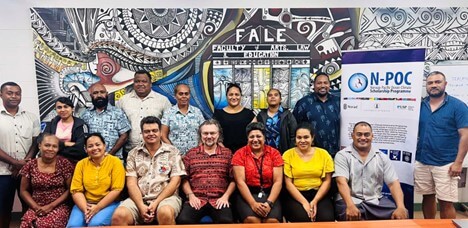Related News

The Norway-Pacific Ocean-Climate Scholarship Programme (N-POC) scholarship programme proudly announced the completion of another significant milestone since its inception.
Seventeen N-POC PhD scholars have recently completed and passed the first of their inaugural courses, titled Multidisciplinary Methodologies for Global Challenges: Pacific Research Narratives (NPOC903), which began on the 10th of January and concluded on the 15th of March.
This course was delivered by academics from the University of Bergen (UiB), as a standard requirement of PhD programmes.
The innovative course, spanning five modules, was jointly facilitated by Associate Professor Geir Henning Presterudstuen, PhD scholar Mr Håkon Larsen and Professor Edvard Hviding (N-POC Coordinator), all of UiB. It was designed to equip participants with invaluable skills and perspectives crucial for their PhD research. This course integrated Western scientific perspectives and paradigms with the rich cultural and methodological traditions of the Pacific Islands.
The N-POC scholars were encouraged to explore how to harness Indigenous knowledge and interweave it with Western research methodologies. The highly interactive course has given N-POC PhD students a more precise knowledge of the connections between Indigenous wisdom, how knowledge is preserved and transferred, as well as using academic research methodological skills to ethically capture this knowledge to complement and strengthen their research.
The course concluded with each PhD scholar presenting a three-minute summary of their research to a distinguished panel including Dr Joeli Veitayaki, a former USP academic, Dr Katy Soapi, the
Coordinator for Partnerships and Engagement at SPC, and Mr Aliioaiga Feturi Elisaia, the High Commissioner of Samoa to Fiji, who all shared heartfelt accolades for the important research being undertaken by all of the N-POC scholars.
By using an inclusive and interactive approach for the delivery of this course helps build a stronger foundation for knowledge that can bridge the Ocean-Climate nexus, and enable USP’s researchers make significant contributions to policies tailored to the Pacific context.
This course has also unearthed some special ways researchers can contribute to Pacific story-telling as a means to communicate their research to a wider audience. The N-POC scholars are excited as they learn news ways to grow as confident and proud Pacific researchers, amplifying the voices from the Pacific within and beyond academia.
The NPOC scholars will also complete an additional two courses before mid-2024, with the UiB Summer School in Norway, and then a 10-day programme focused on international environmental diplomacy to be held at the UN Headquarters in New York.
The N-POC programme’s mission is to support world-class research on critical issues related to the ocean and climate nexus impacts in the Pacific region, to inform better policies and practices.
The programme continues to make an impressive contribution to the collective knowledge, understanding and wisdom to benefit the Pacific region, for which USP, UiB and the Norwegian government are very proud.